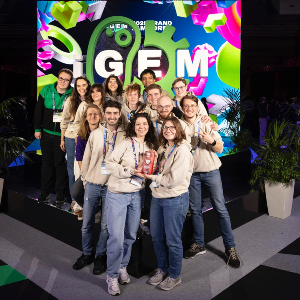iGEM Munich wins Best Diagnostics prize
17 Nov 2025
Munich students receive award for best diagnostics project at Grand Jamboree
17 Nov 2025
Munich students receive award for best diagnostics project at Grand Jamboree

iGEM Munich wins Best Diagnostics prize
Every year, the international iGEM (International Genetically Engineered Machine) competition for synthetic biology brings together students from all over the world. In October, more than 400 teams presented their research to over 10,000 participants in Paris and unveiled innovative approaches to solving global challenges.
Exchanging ideas, presenting results
The iGEM Munich team is made up of students from the two leading universities in Munich, LMU and TUM. This year, the team also included students from the Elite Graduate Programs "Human Biology – Principles of Health and Disease" and "Responsibility in Science, Engineering, and Technology".
InkSight – a cell-based tattoo as a sensor
Our team presented InkSight, a tattoo made from genetically modified mammalian cells for continuous monitoring of biomarkers. Fluctuations in biomarker concentrations are made directly visible via a pigmentation change of the tattoo driven by melanin. Encapsulin nanocages with tyrosinases ensure localized, safe melanin production. The biomarker sensing is achieved with the Modular Extracellular Sensor Architecture (MESA). InkSight is thus the first continuous, cell-based tattoo biosensor with visual output, creating an innovative platform for decentralized diagnostics and personalized medicine. This project combines synthetic biology, bioengineering, and a translational approach in a patient-oriented biosensor.
iGEM is more than just lab work
Our work for iGEM extends far beyond laboratory experiments. Over the past year, we brought synthetic biology topics to the public and enabled school students to gain hands-on experience in the lab. During Girls’ Day and iGEM@School, we supervised experiments, evaluated data, analyzed problems, and taught the basics of Python. Participants from high school also had the opportunity to explore different study programs.
In addition, we developed software for the rapid creation of new MESA receptors, which was awarded the prize for Best Software Tool. All experiments, results, and outreach activities are documented on our wiki–from the project overview and analyses to instructional videos. The website received the award for Best Wiki for its structure and practical relevance and now serves as a model for future iGEM teams.
The Grand Jamboree in Paris gave us the opportunity to present our project and research to teams from around the world and experts from science and industry in a live presentation and at our booth. We are also proud to have been nominated for all the prizes we were aiming for, to have placed in the Top 10 out of over 400 teams, and to have been awarded the prize for Best Diagnostics project. In addition, the team once again brought home a gold medal for “Excellence in Synthetic Biology” to Munich! Our journey would not have been possible without the support of our sponsors, including the Elite Network of Bavaria.
Further details about the project can be found in our wiki or in our presentation.
If you would like to join the iGEM Munich 2026 team, join our kick-off events, first taking place on Friday, 21.11.2025 at 18:30, LMU Martinsried, Großhaderner Str. 2, B01.019, and follow our social media for further events.
Anna Tichá, Emma Schwarze, Filipe Bergdolt, Giuseppe Oricchio, Matvii Lomonosov, Friedrich Irmer, Kalina Elkin, Jonas Turzanski Fortner, Aeneas Tews, Annika Siebenhaar, Igor Koop, Natalia Kuzmierkiewicz, Raya Moyankova, Felipe Navarro. (Foto)